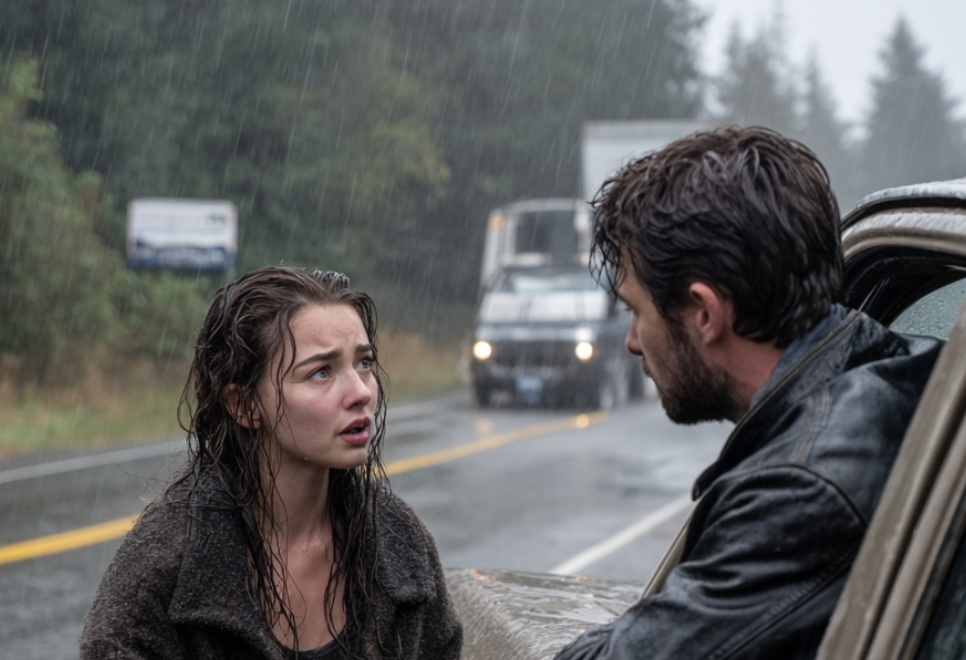A dark night, shot through with cold and a storm wind, seemed to have stepped off the pages of a grim fairy tale. The sky, shrouded in clouds, appeared to be hiding the moon on purpose, leaving the world at the mercy of a relentless rain that lashed the asphalt as if trying to wash all life from the earth. The wind, tearing in from the north, ripped the last yellowed leaves from the trees with fury, flinging them into the faces of passersby as if trying to stop anyone who dared go out in such weather. The road leading out of town was deserted; only the occasional headlights in the distance reminded one that somewhere out there, in that pitch darkness, life was still beating.
Ivan Morozov, sitting behind the wheel of his old but faithful 1995 Volga, felt the cold seep through the thin soles of his shoes and creep up his legs like icy tentacles. The car, once his father’s pride, now creaked and groaned at every turn, and the heater—the last bastion of warmth—suddenly fell silent, as if tired of fighting the foul weather.
“What the hell!” he blurted, gripping the steering wheel tighter, trying to keep control not only of the car but of his emotions.
He longed for only one thing—to get home, wrap himself in a blanket, hear his children’s laughter, feel his wife’s warmth, press against her and forget for a while that the world outside the window was not just rain, but something more—something heavy, oppressive, almost sinister.
But at that moment the headlights snatched a figure from the gloom at the roadside.
A woman stood there.
Fragile, almost ghostly, she seemed a part of the night itself—merging with the shadows yet still fighting for her place in reality. A long coat, soaked through, clung heavily to her body; her hair stuck to her face, and her eyes, gleaming in the headlights, were full of despair and hope at once. She waved not like a hitchhiker but like a drowning person grasping at a straw.
Ivan braked hard, flicked on his turn signal, and stopped, nearly skidding onto the wet shoulder.
“Thank you!” she shouted as soon as he got out of the car; her voice trembled, but there was genuine gratitude in it. “You… you’re my angel!”
Without thinking, he ran around the car and flung open the passenger door.
“Quick, get in! You’ll freeze to the bone!” he yelled over the rain. “In weather like this, even a bear wouldn’t come out—and here’s a lady in a coat!”
But the woman suddenly drew back, as if frightened.
“No… no, thank you. I just… my car stalled. There, past the bend. I tried to call a tow truck, but my phone—no signal. I thought maybe you have service…”
Ivan pulled out his old Nokia and looked at the screen.
“Afraid this is a dead zone for radio waves. No network, no magic. But I can take you to the nearest gas station. They’ve definitely got a phone. And tea. And somewhere dry.”
The woman hesitated. Her fingers clutched her bag as if her whole life were inside it.
“Listen,” Ivan said gently, almost in a whisper. “My mother is… probably about your age. If she were in trouble like this, I’d pray someone would stop. So don’t overthink it. I’m just helping a person.”
Those words, simple and sincere, seemed to break down the last wall of mistrust. She nodded, got into the car, and tried not to touch the seats, as if afraid to leave a trace of her fear.
To ease the tension, Ivan began to talk. He spoke about his children—about Zhenya, the eldest, a smart natural leader; about Dasha, a dreamy artist; about Liza, the youngest, already as sly as a little fox. He spoke about his wife, how they were expecting their fourth child together, hoping for a boy, joking that they had already picked a name—Alexei, after his grandfather.
“As for work… well, it happens,” he added with a touch of sadness. “My pay’s been delayed, the boss is on vacation, and the bills don’t wait. But we’re holding on. We always have.”
His words sounded not like a complaint but like a confession, an acknowledgment that life is hard and yet still worthy of love.
When they reached the gas station, the woman—who introduced herself as Valentina Pavlovna—took out her wallet.
“How much do I owe you?”
Ivan laughed—sincerely, loudly, from the heart.
“Not a single kopeck! My wife and I have a tradition. We call it the ‘Chain of Kindness.’ You help someone—and you ask only one thing: that they help the next person. That way kindness doesn’t disappear; it grows like a snowball. So your job is just to pass it on.”
Valentina looked at him for a long, almost piercing moment. Then she nodded.
“I’ll pass it on,” she said softly.
At the station she called for roadside assistance, then, shivering with cold, headed to the roadside café. There she was met by a young waitress—with tired eyes but a warm smile and an unmistakable pregnancy.
“Goodness, you look wrung out!” the girl exclaimed. “I’ll bring a towel and the strongest tea we’ve got!”
She brought not just tea—she brought warmth. Two dry towels, a cozy blanket, a slice of homemade pie, and the kind of care the world so often lacks.
When Valentina finished, she asked for the bill.
“Two hundred fifty,” the waitress said.
Valentina laid down a thousand.
“Oh, that’s too much!” the girl protested.
“Wait,” Valentina stopped her.
While the waitress went for the change, she quietly slipped another two thousand rubles under the teapot along with a note written in a neat, steady hand:
“Someone once helped me the same way. You don’t owe anything. Just don’t break the Chain of Kindness.”
When the girl returned, she didn’t understand at first. Then she saw the money. Then—the note.
And she cried.
Warm, quiet tears rolled down her cheeks. Not from joy, not from relief—but from the realization that in this harsh world there is still light.
She came home late. In the hallway, on the couch, her husband was sleeping—tired, with a full beard and a scar on his eyebrow from an old accident. Beside him, snuggled together, slept three daughters—the eldest had been reading, the middle one drawing, the youngest already dozing, hugging a plush rabbit.
She walked over quietly and kissed her husband on the forehead.
“I love you, Vanya Morozov…” she whispered.
A few days passed.
Ivan was sitting with his wife in the evening, watching the news.
And suddenly—his face on the screen.
The announcer’s voice: “The story of an ordinary driver who didn’t pass by has gone viral. Valentina Pavlovna—a renowned chef and owner of a restaurant chain—wrote on social media about how a stranger in an old car saved her that night. She launched a fundraiser for the Morozov family and promised to double every penny people send.”
At first they raised one hundred thousand. Then two hundred. Then three hundred and eighty thousand.
The money came from Vladivostok and Murmansk, from villages and megacities. People wrote: “I too was once stranded on the roadside. Now I’m part of the chain.”
And a month later, in the maternity hospital, a newborn son lay in Ivan’s arms.
Beside him stood a woman in a tailored suit, with warm eyes and a smile full of gratitude.
“I’d like to be his godmother,” said Valentina Pavlovna. “If you’ll allow it.”
Ivan nodded.
“Only if you promise,” he smiled, “to keep the Chain going.”
She promised.
And the chain went on.
Because goodness doesn’t end. It only begins.



